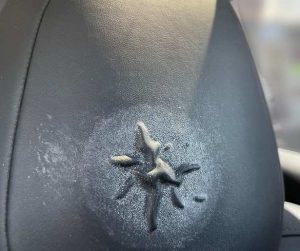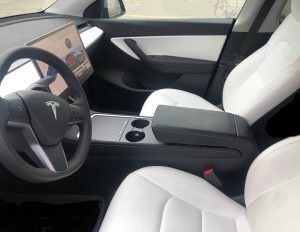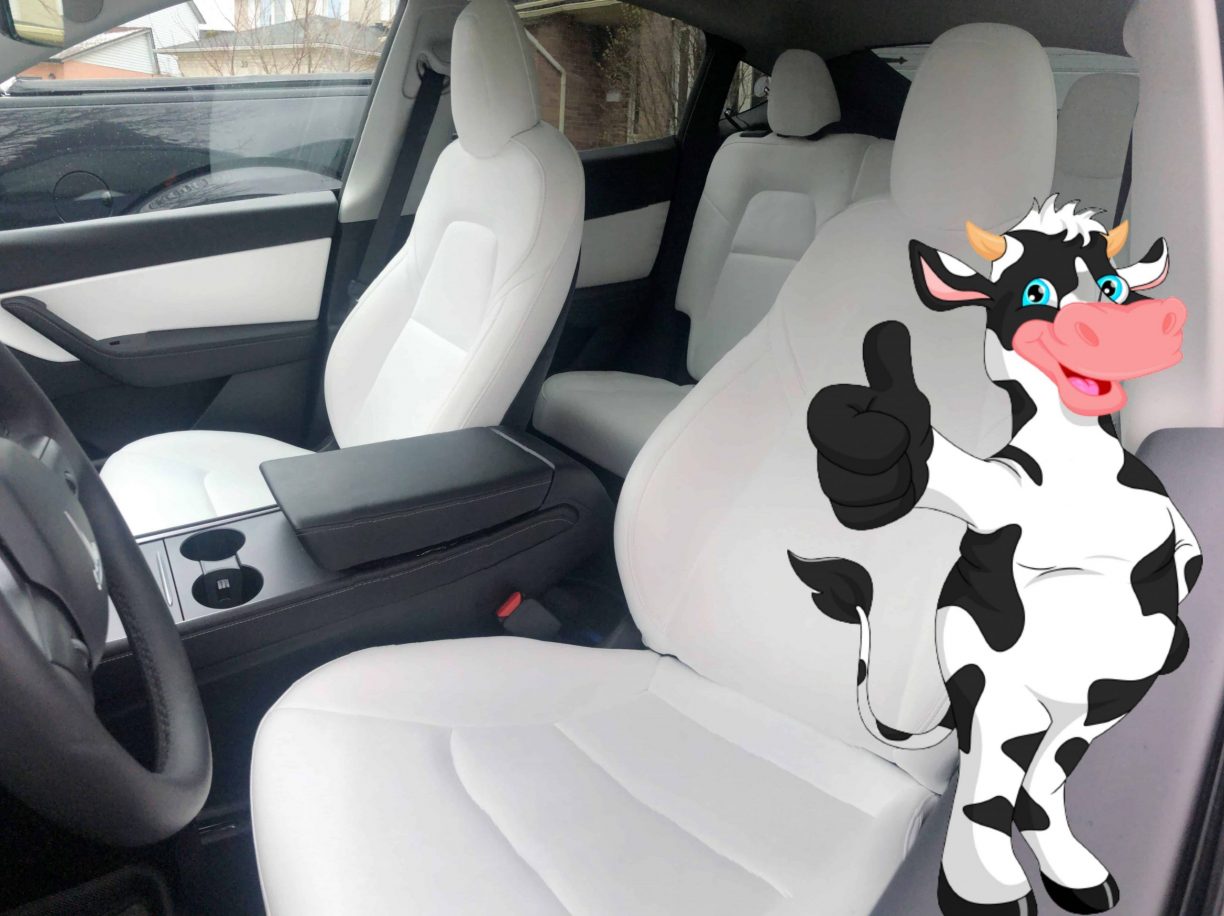Spilling the Tea on Tesla’s Vegan Leather Seats
Tesla’s black and premium Ultra White vegan leather seats are cruelty-free, 30% lighter than animal hide and more environmentally sustainable. Derived from plastic-based and natural fibres, vegan leather is soft, comfortable, waterproof and easy to clean. Be careful with chemicals and dark clothing dyes that may damage interiors.
Whether you’re thinking of indulging in Tesla’s Ultra White vegan leather premium interior, or wondering how to clean and maintain the sleek white seats you have, EVehicle Pro has you covered! And if you’re curious about how environmentally friendly vegan leather actually is, or whether the horror stories you’ve heard about blue jeans and bubbling are accurate, we’ve got those answers too.
Vegan Leather Interiors
Vegan leather (also called “eco-leather” or “synthetic leather”) is touted as an ethical version of traditional animal hide that supports Tesla’s stand on sustainable energy.
Vegan leather is a smart decision for electric vehicles, as it is 30% lighter in weight than animal hide leather, contributing to the speed and efficiency of Tesla electric vehicles.
Critics may call the vegan leather “plastic” or “PVC”, but this is not entirely accurate and doesn’t reflect the full scope of technology and luxury inherent in vegan leather.
What are Vegan Leather Seats Made From?
Most synthetic leathers are based on plastic-based, fossil-fuel derived materials such as polyvinyl chloride (PVC) and polyurethane (PU), to which natural fibres such as wood pulp are added. More eco-friendly synthetic leathers are made from cork, kelp, mushrooms, kombucha-cultures, cactus or pineapple leaves, eucalyptus and polyester fibres.
Although Tesla has not disclosed the specific manufacturer of their vegan leather interiors, the company has been associated with Ultraleather by Ultrafabrics, also used by other upscale car manufacturers. Ultraleather uses wood pulp in their polyurethane-based eco-leather products to support their move toward sustainability.
Environmental Impact of Cow Hide and Faux Leather
Traditional leather car seats use cow hides, and cattle farming is known to contribute to deforestation and 14.5% of global greenhouse gas emissions. In many cases, animals are also raised in confined animal feeding operations (CAFOs), with cruel conditions and exposures to toxic chemicals.
Compared with animal hide leather manufacturing, luxury synthetic leather such as that made by Ultrafabrics, generates only a quarter of the amount of carbon dioxide in production. Other vegan leather manufacturers boast using wind power and a third less water in production, as compared with animal-based leather.
Although vegan leather is vitally important for animal welfare, greenhouse gas emissions and the planet’s forests, the manufacturing of synthetic leather is not without consequence. Plastics used in the process contain toxins and dangerous dioxins. They also don’t fully biodegrade, and can release harmful phthalates and micro-plastics that can affect the health of animals and the environment.
We hope that Tesla will eventually use completely non-plastic vegan leather, and move even closer toward their goals of total sustainability.
What Do Vegan Leather Seats Feel Like?
Many conscientious women and men are familiar with vegan leather handbags and accessories. They feel and look like leather, are durable and easy to clean.
Vegan leather typically resists scratching, cracking and peeling that might mar leather from animal hides, although exposure to chemicals and high UV levels can be problematic. Synthetic leather doesn’t age to form a patina like animal hide leather, and so it maintains its original look and feel.
Although some people have reported vegan leather cracks and ages poorly, our EVehicle Pro families have used vegan leather products for years and they still look and feel brand new.
There is no smell associated with quality vegan leather (some people report a fishy smell with low quality synthetic leather products).
Pros and Cons of Vegan Leather Seats
If you’re trying to decide whether to get traditional fabric or vegan leather in your Tesla, consider these pros and cons:
Pros of vegan leather seats:
- waterproof
- soft and comfortable
- cruelty-free
- more sustainable than animal hide leather
- simple to clean with non-detergent soap and water
Cons of vegan leather seats:
- can experience color transfer
- reports of de-lamination and bubbling when exposed to chemicals
- may dry out with prolonged exposure to UV rays
Problems with Tesla’s Vegan Leather Seats
Bubbling of Headrest and Seats
Some Tesla owners have complained about the quality of their vegan leather seats, steering wheels and headrests, reporting that the material has bubbled, expanded and warped.
Bubbling can occur when certain chemicals interact with polyurethane resin. Cosmetics and head oil within a particular pH spectrum are believed to interact and cause swelling of the material when exposed for lengthy periods of time, under high temperatures. The chemical erodes and penetrates the coating and swells, leading to de-lamination of the adhesive and bubbling.

Tesla has responded to criticism by claiming any issues are related to the vegan leather reacting with body lotions, hair sprays, gels, sunscreen, sanitizers and liquid from e-cigarettes or vape pens – not a manufacturing defect. The owner’s manual provides clear instructions on cleaning the interior, as well as specifying which solvents should not be used on animal-free leather, including:
- alcohol
- bleach
- citrus
- naphtha
- silicone-based products or additives
Color Transfer
Be careful with dyes, such as indigo dyes from dark denim and clothing, that come into contact with the seats. Over time, certain dyes can diffuse into the seat material and cause staining, that can be irreversible. Check your car’s interior often, and follow the specific cleaning instructions.
Should I Get White Seats in My Tesla?
Tesla’s Ultra White interior is stunning, and our experts at EVehicle Pro have encountered no issues to date. If you’re trying to decide whether to order the Ultra White interior, we recommend that you consider these five questions:

1. Do you wear dark blue (or black) jeans frequently?
A variety of clothing and accessories contain dyes that could transfer onto Tesla’s white seats. Over time, dyes can diffuse into the seat material and cause staining. Sometimes the color transfer is irreversible. Having said that, our EVehicle Pros live in jeans and, although we have noticed a slight color transfer onto the seats maybe once every few months, it’s easily and completely cleaned with a light wipe using non-detergent soap and water (or a non-alcohol-based baby wipe in an emergency).
2. Do you frequently carry pens, markers, paint or oily products? Keep them in a safe spot with lids on, or be prepared for more frequent cleaning.
3. Do you have young kids? Keep pens, markers, paint and highly dyed items in the house, and clean off crumbs and other debris from under car seats and booster seats. The good news is most drinks like water, soda and milk will easily wipe up from waterproof faux leather seats. Avoid deeply colored foods and drinks (like blueberries or grape juice), and keep greasy foods like chips and fried foods out of the car.
4. Do you have a dog? Having a fur kid is no reason not to get the Ultra White premium interior! Just invest in a seat cover and keep nails trimmed. Although our EVehicle Pro dog lovers have found that the faux leather holds up well, it’s best to prevent hair, mud, drool and potential scratches with a seat cover. Plus, dogs inherently carry oils in their skin and fur that could eventually contribute to wear or damage to seats.
5. Do you wear loads of cosmetics, sunscreen, temporary hair dyes/sprays, body make-up or self-tanner? There have been reports of vegan leather bubbling due to reactions with chemicals in some cosmetic products. And, nobody wants their cool pink highlights to transfer into a pink head rest, or a Californian fake tan to turn seats brown. So if you’re a frequent user of cosmetics and dyes, you may wish to think twice about the Ultra White premium interior option.
FAQ
What’s the difference between black and white interiors?

Here’s how Tesla’s premium Ultra White and standard black interiors compare:
Ultra White:
-Vegan leather
-Premium interior costs more ($1000)
-Dirt is easier to spot
-Easy to clean with non-detergent soap and water
-May stain from the dyes in some dark clothing
-White is cooler on hot days or in regions with lots of sunshine
-Interior trim comes in matching white for a seamless clean look throughout the cabin
-Tesla’s Ultra White is futuristic, sleek and calming so you can get super creative naming your Tesla!
Black:
-Vegan leather
-Comes standard (no additional cost)
-Hides dirt and stains better
-Easy to clean with non-detergent soap and water
-Retains heat more than a white interior (especially in hot, sunny climates)
-Interior trim is faux wood which contrasts with the black seats
-Tesla’s standard black is traditional, classic and conservative but can still rock some very cool names!
Do vegan leather seats hold up well with dogs?
Although faux leather holds up well, it is typically thinner than animal hide, so invest in a seat protector to prevent hair, mud, drool and scratches. Keep your dog’s nails trimmed, especially large dogs that naturally exude more weight onto sharp nails. Dogs also inherently carry oils in their skin and fur that could contribute to damage of vegan leather, so seat covers are highly recommended.

